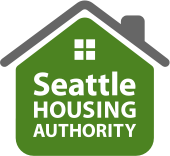Seattle Housing Authority commissioners approve new waiting list preferences
SEATTLE—December 16, 2002—Seattle Housing Authority has changed the way it gives priority to people on its waiting lists for housing assistance. The new rules, or "waiting list preferences," were unanimously approved by SHA’s Board of Commissioners at a board meeting on December 15.
Under the new preferences, first priority for housing assistance will go to all extremely low-income and homeless applicants. Within the first priority group, applicants who have been referred by qualified housing and service programs will receive expedited processing.
Applicants who had first priority under the previous rules but do not qualify under the new rules will retain their first priority status until March 2003. Regardless of their priority status, all applicants for public housing will continue to be screened to ensure that they will be good tenants, and SHA will continue to perform criminal background checks for applicants to the Housing Choice Voucher Program.
Why change the preferences?
SHA changed the waiting list preferences because they were difficult to manage and often counterproductive for applicants. For example, thanks to the new policy’s simpler definition of "homeless," homeless applicants will no longer have to go through a complicated process to establish first priority.
"Administering the old preferences was extremely difficult," said Kathy Roseth, director of PorchLight. PorchLight includes the admissions and Section 8 departments of SHA.
According to Roseth, the new preferences will make it much easier for those with the most urgent housing needs to receive assistance.
"We want to go directly to the people with the most urgent needs and highest likelihood of successful tenancy," she said.
Because all homeless people and people earning 30 percent of median income or less will have first priority under the new preferences, applicants will not have to prove that they are overcrowded, displaced or rent burdened in order to get and retain first priority status.
That means overcrowded, displaced and rent-burdened people will continue to receive first priority, because they almost always have incomes below 30 percent of median. But applicants and staff will no longer have to endure the difficult, invasive and time-consuming task of verifying these conditions.
Furthermore, by giving first consideration within the highest priority group to applicants from qualified housing and service programs, the new preferences will encourage households’ movement through Seattle’s continuum of affordable housing, from shelters to permanent affordable housing. Giving housing to applicants that no longer need supportive environments frees up services for those who do.
SHA will offer no more than half of new public housing admissions or Housing Choice Vouchers through referrals, so applicants will not have to be associated with an agency to receive assistance.
"The new preferences continue to give first priority to the very lowest income households, and at the same time remove the administrative barriers that have prevented many needy people from gaining access to SHA resources," said Roseth. "We expect that the application process – when the changes are fully implemented – will be simpler, faster, and more logical from the applicant’s point of view."
Working with stakeholders
The new policy emerged from months of revision and public discussion, during which stakeholders attended several meetings and offered feedback. All comments were taken into consideration, and several suggestions found their way into the final policy.
The Seattle-King County Coalition for the Homeless, or SKCCH, was one of the most active contributors to the feedback process, and praised SHA’s receptiveness in its official response letter to the new policy.
"Thanks for respectfully considering SKCCH’s position and, by way of this process, listening to the voice of the homeless people we work alongside," wrote co-chairs Tara Connor and Dan Owcarz. "We look forward to continued dialogue on into the future."
New waiting list preferences
For public housing, first priority is given to applicants earning 30 percent of area median income or less. Expedited processing occurs within this group for applicants who are referred by qualified providers, subject to terms of executed referral agreements. Providers include recognized transitional housing programs and other service-enriched housing programs.
For the Housing Choice Voucher Program, first priority is given to applicants earning 30 percent of area median income or less. Expedited processing occurs within this group for applicants who are referred by qualified providers, subject to terms of executed referral agreements. Providers include recognized transitional housing programs, other service-enriched housing programs case management to people with disabilities.
"Extremely low-income" income limits
Applicants earning 30 percent of area median income or less are considered to be extremely low-income. Income limits vary by household size.
Seattle Housing Authority definition of "homeless"
An applicant household that is: 1) living on the street, in an emergency shelter, or in a transitional housing facility; or 2) is a client of a case-management program serving the homeless; or 3) has met one of these conditions within the 12 month period prior to their eligibility determination.
